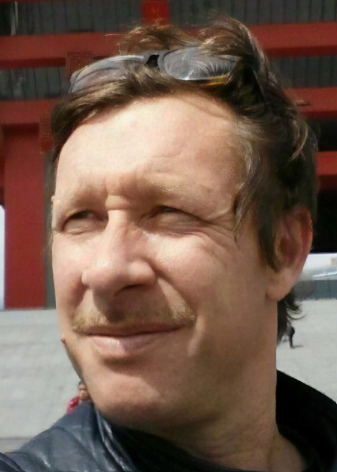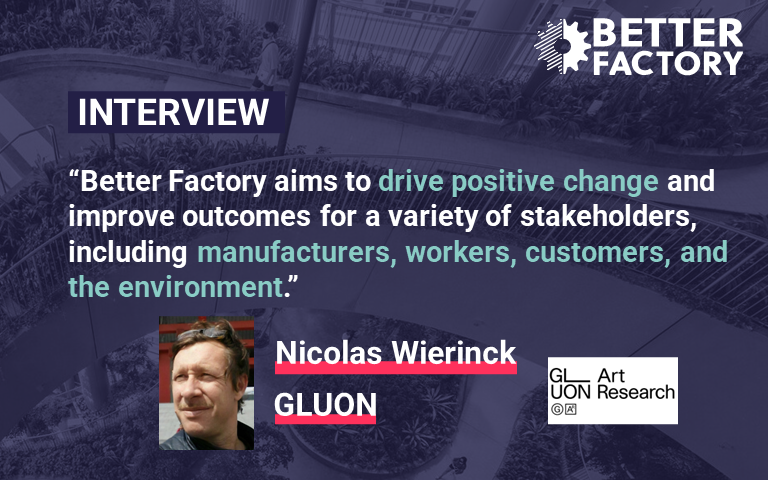Welcome to our interview series with the partners running Better Factory. Today we are lucky to be joined by one of our all-star team, Nicolas Wierinck, to learn more about Gluon Art & Research and their role in the project!

Nicolas Wierinck is Head of Productions, at Gluon Art & Research. GLUON is developing a platform that maximizes collaborations and confrontations between different actors; their most important mission is to stimulate partnerships between artists, science and technology. An essential part of GLUON’s activities also consists of forming multidisciplinary teams in which artists, researchers (scientists & technologists) and companies exchange expertise and knowledge. Through its Art&Development labs, GLUON supports residencies of artists in the R&D departments of companies, research institutes and universities.
Thank you for joining us today! Please could you give us a short introduction to GLUON, and your role there, in your own words?
Gluon is building an agora and workplace that lets artists imagine and create new possible scenarios for the future together with public and private players and citizens.
Technology has an increasing impact on our future and sphere of life. Therefore, GLUON Art&Research facilitates and intervenes in cross-sectoral fellowships that bring together artists, industry and research institutions in a speculative and art-driven research, into more balanced relationships between humans, their technology and the natural or work environment.
Through GLUON Education and GLUON Connect, we involve the street, youngsters and the citizens. GLUON has developed a unique art-based educational format of Labs, workshops and Pop-Ups with the relevant stakeholders. Together with activists, critical journalists, entrepreneurs, researchers, teachers, students and pupils, the artists acquire and share insights, networks and technological skills to engage in more critical and informed dialogues about the future.
The role of GLUON as Art Mentor and Educative Developer involves bringing a creative and imaginative perspective to the redesign of product portfolios. By working alongside manufacturers, business mentors, and technology experts, GLUON contributes to the development of new and innovative products and business models that are informed by the latest advancements in technology. Overall, the role of GLUON in Better Factory brings a unique and creative perspective to the challenge of improving product portfolios and trainings to remain competitive in a rapidly changing market.
Thank you! To someone reading this who has never heard of Better Factory before, how would you describe it in simple terms, and why do you feel it is significant?
Better Factory is a platform that helps Small and Medium-sized Manufacturers (SMEs) improve their product portfolio through collaboration with Business and Arts mentors and technology experts. The goal is to help manufacturers enter new markets by creating customizable and personalized products, which can be achieved through the analysis of their current portfolio and the application of new digital technologies. Better Factory uses a RAMP IoT platform and provides an Open and Standardized Advance Production Planning and Scheduling (APPS) system to optimize production and reduce waste, energy, and resources. The platform aims to assist manufacturers in transforming their factories into lean and agile facilities, which will enable them to produce batches of new and personalized products. The platform’s use of digital technologies and the provision of an APPS system also helps manufacturers to remain competitive in an increasingly digital and rapidly changing market. Overall, Better Factory aims to support the growth and success of SMEs in the manufacturing industry.
GLUON is responsible for the conceptualization of VR Labs in which youngsters and students prototype VR and AR solutions for SMEs.
GLUON is more heavily involved in two work packages of the project. In Work Package 1, you’re helping to identify skill gaps and develop online training to support the SMEs’ digital skill development, drawing on work done by S+T+Arts Academy Labs. Could you expand on what this will look like, for any SMEs reading?
In the context of Better Factory and its involvement in Work Package 1, the focus is on supporting the digital skills development of Small and Medium Enterprises (SMEs). In cooperation with MWCapital, GLUON has been identifying skill gaps and developed online trainings to address those gaps and help SMEs improve their digital competencies.
More specifically, GLUON is responsible for the conceptualization of VR Labs in which youngsters and students prototype VR and AR solutions for SMEs. It provides fast, easy and advanced AR content development solutions to help industrial enterprise customers address workforce challenges and meet business goals. In July 2023 GLUON will organize a second VR Lab. The nine SMEs selected during the Jury Day that took place in January 2023 will be contacted to take part in these training activities.
You’re also involved in the preparation of the mentoring plans for the teams of one artist, one SME and one technology provider, as they embark on their KTE (Knowledge Transfer experiment). Could you tell us about what you expect for this round of participants?
For the knowledge transfer experiment (KTE), we would expect the following outcomes for the participating teams (artist, manufacturing SME, and technology provider):
- Improved understanding and collaboration between the three different sectors, leading to a cross-fertilization of ideas and a more integrated approach to problem-solving.
- Increased awareness and appreciation of the unique skills and perspectives that each sector brings to the table, leading to a more effective utilization of their collective expertise.
- Development of new solutions or approaches to challenges that could not have been achieved by any single sector working in isolation.
- Better transfer of knowledge and expertise between the participants, leading to improved skills and capabilities for all.
- The establishment of strong relationships and networks that can be leveraged for future collaboration and innovation efforts.
Overall, the goal of a KTE is to facilitate the exchange of knowledge and expertise between different sectors in order to drive innovation and drive progress.
What are you personally most excited about achieving with Better Factory?
With Better Factory we are mostly excited to achieve improvement within the efficiency and sustainability of industrial processes, potentially leading to benefits such as:
- Reduced waste and increased resource utilization, leading to a more sustainable and environmentally friendly manufacturing process.
- Improved product quality and reliability, leading to increased customer satisfaction and loyalty.
- Increased efficiency and productivity, leading to lower costs and increased competitiveness for manufacturers.
- Better working conditions and increased job satisfaction for workers, leading to a more motivated and productive workforce.
- The development of new technologies and approaches that could drive innovation and progress in the manufacturing industry.
In general, Better Factory aims to drive positive change and improve outcomes for a variety of stakeholders, including manufacturers, workers, customers, and the environment.
How do you see the future of the RAMP platform, after the project has ended?
The future of the RAMP (Rapid Advancement in Manufacturing Program) platform after the project has ended will likely depend on a number of factors, including the success of the platform during the project, the ongoing needs and demands of the manufacturing industry, and the available resources for maintaining and updating the platform.
Ultimately, the future of the RAMP platform will be shaped by the efforts of those involved in its development and use, as well as broader trends and developments in the manufacturing industry.
Assuming the RAMP platform is successful and well-received, there are several recommendations for its future:
- Continued development and improvement of the platform, incorporating feedback and suggestions from users, to meet the evolving needs of the manufacturing industry.
- Expansion of the platform to include additional functionalities and capabilities, such as new technologies or processes.
- Integration with other platforms or systems to increase its reach and impact, allowing manufacturers to access a wider range of resources and expertise.
- Commercialization of the platform, allowing it to be adopted and used by a wider range of manufacturers and stakeholders.
No doubt there will be some readers that are keen to meet you to talk more about the project and your role in it. Which events can people find you at in 2023, and beyond?
13 -15 October 2023, I Love Science, Brussels, Belgium
26 – 29 October 2023, KIKK Market, Namur, Belgium (TBC)
If you’d like to learn more about our partners or KTEs, just head back to the Insights section to read more interviews!

